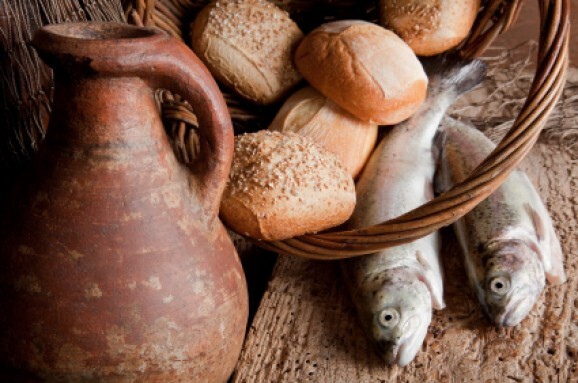Once upon a time the Pope had a friend who was a fisherman and the fisherman was having a hard time making a living, so the Pope decided to require all Catholics to eat fish on Fridays in order to help his friend.
Not really. The first Pope was actually a fisherman. But back then meat wasn't a staple food. For most ancient peoples, "flesh meat" (birds and mamals) was a luxury enjoyed by the rich. The rest of the people only ate meat on special occasions. Abstinence from meat meant everyone had to eat like the poor.
Because Jesus Died on Friday
Jesus sacrificed his life for us on a Friday. Christians commemorate His sacrifice by offering some small sacrifice ourselves. Early Christians used to be much more strict, essentially going vegan on a fast day. The Orthodox Christian community continues to fast from meat, fish, eggs, dairy products, olive oil, wine and other alcoholic drinks (except sometimes beer :-). I suspect that Catholics gradually allowed dairy, eggs, etc. until only "flesh-meat" remained on the do-not-eat list.
We need regular reminders that Jesus died for us. In fact, the Church expects every Catholic to do some penance every Friday of the year (see the excerpt from Canon Law below). After Vatican II the U.S. Bishops have allowed Catholics to substitute another penance instead of abstinence from meat. Except during Lent, when meat is the rule. You can give up more but you shouldn't do less.
I avoid meat most Fridays throughout the year. My mom always cooked meatless meals on Fridays. It introduced us to unique dishes like pizza with anchovies or linguine with imitation crab meat. At college I was free to decide for myself. The steaks and hamburgers looked SO good on Fridays. Then I realized if it was difficult, it was probably worth doing. I'm just too lazy to think up some other sacrifice.
Good for Us, Good for the Environment
A little sacrifice never hurt anyone; most of us need more self-denial anyway. The state of Wisconsin is so accustomed to following the old meatless rules that people eat fish pretty much every Friday. During World War I and II there were campaigns encouraging people to avoid meat one day a week as a way of freeing up commodities. More recently there has been a campaign for Meatless Mondays as a push for healthier living and environmental awareness. So next time you're enjoying a Fish Friday remember: Catholics were meatless before meatless was cool.
The Official Catholic Fasting Rules
Can. 1249 The divine law binds all the Christian faithful to do penance each in his or her own way. In order for all to be united among themselves by some common observance of penance, however, penitential days are prescribed on which the Christian faithful devote themselves in a special way to prayer, perform works of piety and charity, and deny themselves by fulfilling their own obligations more faithfully and especially by observing fast and abstinence, according to the norm of the following canons.
Can. 1250 The penitential days and times in the universal Church are every Friday of the whole year and the season of Lent.
Can. 1251 Abstinence from meat, or from some other food as determined by the Episcopal Conference, is to be observed on all Fridays, unless a solemnity should fall on a Friday. Abstinence and fasting are to be observed on Ash Wednesday and Good Friday.
Can. 1252 The law of abstinence binds those who have completed their fourteenth year. The law of fasting binds those who have attained their majority, until the beginning of their sixtieth year. Pastors of souls and parents are to ensure that even those who by reason of their age are not bound by the law of fasting and abstinence, are taught the true meaning of penance.
Can. 1253 The conference of bishops can determine more precisely the observance of fast and abstinence as well as substitute other forms of penance, especially works of charity and exercises of piety, in whole or in part, for abstinence and fast.
http://www.vatican.va/archive/ENG1104/__P4O.HTM retrieved 25 Feb 2016
